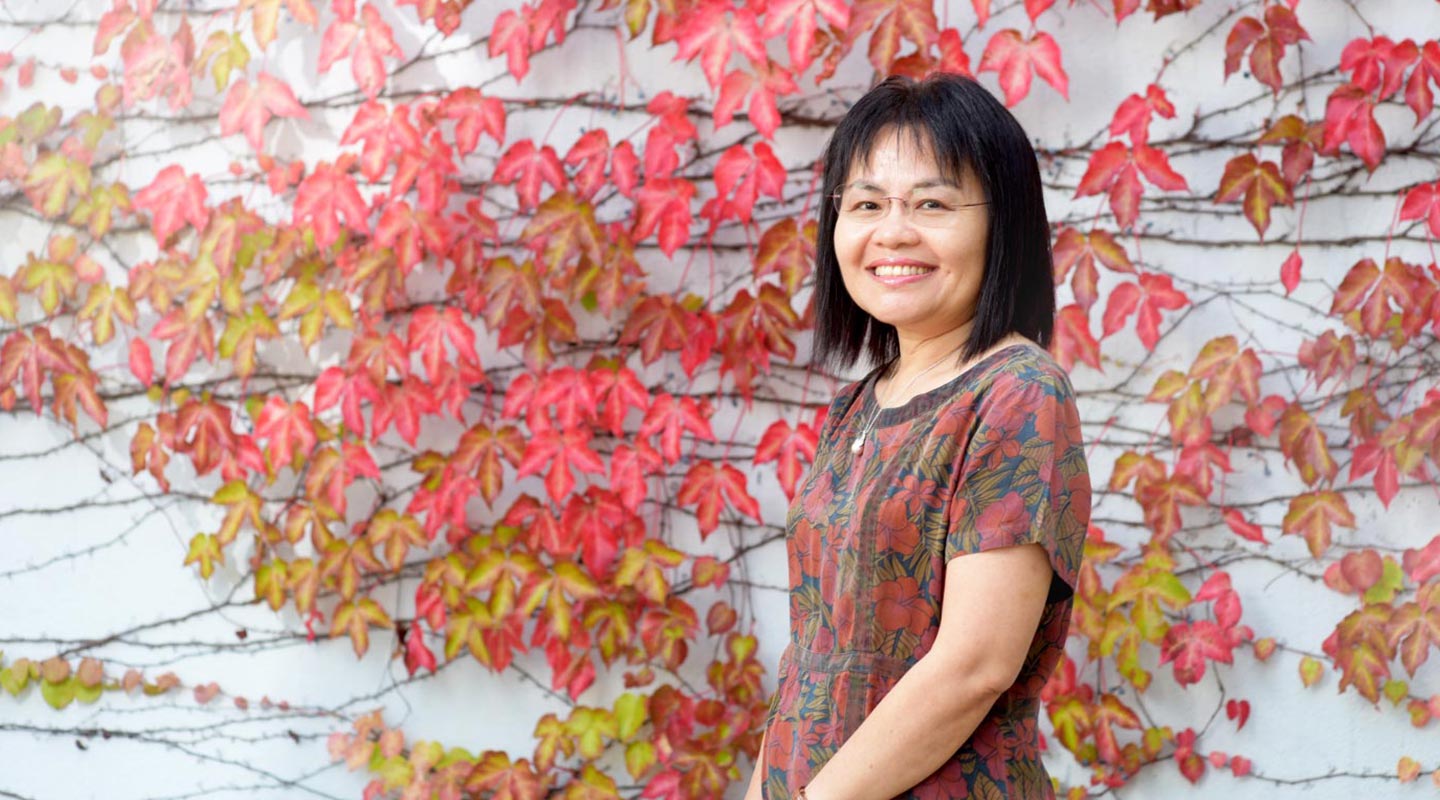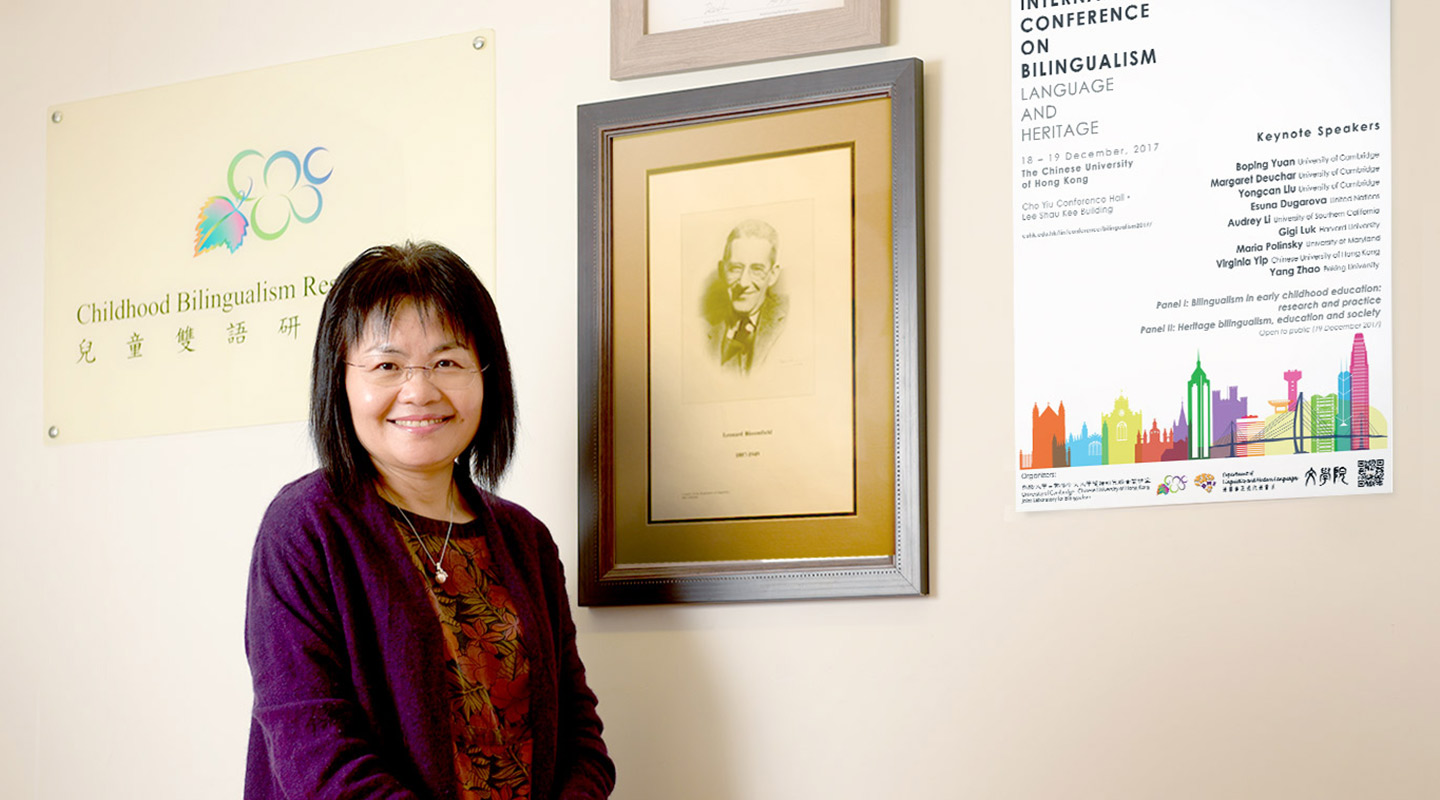Dear readers, With the launch of e-newsletter CUHK in Focus, CUHKUPDates has retired and this site will no longer be updated. To stay abreast of the University’s latest news, please go to https://focus.cuhk.edu.hk. Thank you.
A Bastion of Bilingualism
Virginia Yip Reveals Two-tongue Wonders

‘1 + 1’ is always more than 2, at least insofar as language acquisition in young children is concerned. This is in fact what Virginia Yip has found from her research and personal experience as an academic linguist and mother of three bilingual children.
Virginia Yip, Professor at the Department of Linguistics and Modern Languages of CUHK and Director of the Childhood Bilingualism Research Centre, has researched and published widely on, among other things, bilingualism, second language acquisition, Cantonese and comparative Chinese grammar. Her years of research have taught her two things: first, even at a tender age, a child is capable of mastering two languages at the same time and the bilingual child’s development is magical and phenomenal. Acquiring two languages simultaneously in early childhood is an amazing feat and an inexorable process. Second, childhood bilingualism not only brings linguistic advantages but also confers many cognitive benefits to the child. There is a constellation of cognitive advantages enjoyed by bilingual children in terms of creativity, mental flexibility and the ‘executive function’ of the brain which is associated with attention, focus, problem-solving, inhibitory control, the ability to screen out unnecessary information and prioritize. These advantages have lifelong impact on the child’s cognitive and social development as well as academic achievement that goes beyond language development.
Based on the findings from a series of longitudinal case studies of bilingual children in Hong Kong and overseas communities some of which have appeared in her award-winning book The Bilingual Child published by Cambridge University Press, Professor Yip showed that the processes involved in the child’s simultaneous construction of two grammars are inherently different from that of constructing one grammar only. Bilinguals are not simply two monolinguals in one. There are interactions between the two grammatical systems in the developing child, with the dominant language usually but not always exerting greater influence. A child’s bilingual competence is ultimately determined by factors such as the quantity, quality and intensity of their interactions with other speakers in the linguistic environment.
Professor Yip’s work on bilingualism is not limited to children who speak English and the local vernacular Cantonese. As director of the CUHK-Peking University-University System of Taiwan Joint Research Centre for Language and Human Complexity and co-director of the Bilingualism and Language Disorders Laboratory at CUHK’s Shenzhen Research Institute, her enquiry has been extended to Mandarin Chinese learned and spoken by children from different age, social and geographical groups including Chinese children in mainland China, the UK and the US. The latest brainchild of her collaboration with Dr. Yuan Boping of Cambridge University takes the form of the University of Cambridge–CUHK Joint Laboratory for Bilingualism.
The new Joint Laboratory will be an international platform and magnet for scholars specializing in bilingual development, first and second language acquisition, Chinese language and linguistics and related fields from the two universities, as well as the local, regional and international community. It aspires to be an incubator for research collaborations among leading experts and scholars in these fields.
Where else is a more fitting host of the Joint Laboratory than CUHK, a university which has been relentlessly delivering bilingual education since its inception? Prof. Joseph Sung, Vice-Chancellor and President of CUHK, commended the Joint Laboratory as the first such laboratory to be established by Cambridge University and another university. He added: ‘I am also pleased to note that the Joint Laboratory features interdisciplinary and multidisciplinary collaborations. Apart from Linguistics, members from Chinese Language and Literature, Psychology, Engineering, Educational Psychology are also represented in the Joint Laboratory.’

The Joint Laboratory will be officially launched at the ‘International Conference on Bilingualism: Language and Heritage’ to be held on 18–19 December at CUHK. It will provide an international forum to promote and disseminate research in bilingualism across the lifespan from infancy and early childhood to adulthood with a focus on the acquisition of Chinese across linguistically diverse bilingual and multilingual contexts. Professor Yip said, ‘The Conference features bilingualism through the lens of the intricate relationship of language and heritage, in particular, the acquisition of language as a way to preserve and maintain a speaker’s and the community's heritage and the challenges posed to language learners, researchers and educators.’ The attendance of researchers and practitioners from different countries including Australia, the UK, the US, Hong Kong and Singapore will provide an international perspective on issues in nurturing bilingualism in early childhood and heritage bilingualism across diverse contexts.
Professor Yip’s work has left its mark beyond research labs and academic conferences. Far from being a scholar who confines her research to the ivory tower, she actively reaches out to make a palpable impact on the society. Collaborating with a linguist from the Hong Kong Polytechnic University and a colleague from CUHK’s Faculty of Medicine, the team has developed a tool that assesses children’s mastery of Mandarin and tested over 1,000 children in Hong Kong. Drawing on the early vocabulary inventory of Mandarin-speaking children in Beijing, the finding shows that, among other things, input quantity (time of exposure to Mandarin) has a strong influence on the vocabulary of local children aged 3–6 and that whereas older children (aged 5–6) achieved higher scores they remained as error-prone in certain tone contrasts as younger children. The tool will be valuable to researchers and clinicians as a useful screening test and as an alternative to parental checklists for children’s Mandarin receptive vocabulary.
To Professor Yip, the bilingual child is an endless source of wonders and insights for the adults. ‘Even at the tender age of two, a bilingual child is capable of speaking and switching between two languages fluently, expressing complex ideas and sentence structure that surprise everyone,’ she said. ‘It is hoped that the establishment of the Joint Laboratory with Cambridge would continue and further that journey into the deepest recesses of human language acquisition and intellectual development.’
This article was originally published on CUHK Homepage in Dec 2017.
Read More: